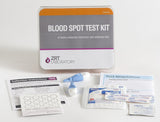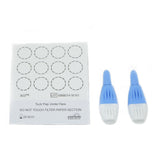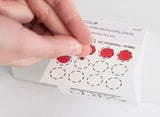The Follicle Stimulating Hormone (FSH) Test is designed for testing Follicle Stimulating Hormone (FSH) and accurately assesses FSH levels in the blood.
Who needs a FSH test?
- You've been unable to get pregnant after 12 months of trying.
- Your menstrual cycle is irregular.
- Your periods have stopped. The test may be used to determine if you have gone through menopause or are in perimenopause.
- You've been unable to get your partner pregnant after 12 months of trying.
- Your sex drive is decreased.
- Weakness
- Weight loss
- Decreased appetite
FSH Test for Women
An FSH test is a simple blood test. Women might be asked to have this test done at a specific point in their menstrual cycle, usually the first couple days. In women, the most common reasons for the follicle-stimulating hormone (FSH) test include:
- Assessing infertility problems
- Assessing irregular menstrual cycles
- Diagnosing disorders of the pituitary gland or diseases involving the ovaries
FSH Test for Men
In men, a follicle-stimulating hormone (FSH) test may be done to:
- Evaluate a low sperm count
- Assess hypogonadism or gonadal failure
- Assess testicular dysfunction
FSH Test for Children
An FSH test might determine if a child is experiencing precocious puberty, which is early puberty. An FSH test may also be used to determine if a child is experiencing delayed puberty. This occurs when sexual features or organs don’t develop when they should.
If you’re a woman with high FSH levels, this may indicate:
- A loss of ovarian function, or ovarian failure
- Menopause
- Polycystic ovarian syndrome, is a condition in which a woman’s hormones are out of balance, causing ovarian cysts.
- A chromosomal abnormality, such as Turner’s syndrome, occurs when part or all of one of a woman’s X chromosomes is missing.
High FSH Levels in Men
If you’re a man with high FSH values, this may indicate:
- Klinefelter’s syndrome, which is a rare condition in men caused by an extra X chromosome that can affect male development
- Testicles that are absent or not functioning properly
- testicles that have been damaged by a disease such as alcohol dependence
- Testicles that have been damaged by treatments such as X-rays or chemotherapy
Low FSH values may indicate that:
- A woman isn’t producing eggs
- A man isn’t producing sperm
- The hypothalamus or pituitary gland, the hormone control centre in the brain, isn’t functioning properly.
- A tumour is interfering with the brain’s ability to control the production of FSH.
Test Result: You will receive your test result 3-5 working days after the laboratory receives your sample. You will see your hormone levels in graphics and numbers on your test results. You will also see laboratory comments by Hormone Specialist PhD Dr in the comments: you will find Dr analysis of your hormone levels and what to do next.
- Collect samples from the comfort of your home and post them to our lab.
- The test must be used within 12 months after the purchase date.
- The test kit includes a laboratory fee: no additional laboratory cost and tax.
- Customers are responsible for shipping their samples to the laboratory.
How does the test carry out?
This blood spot-based testing tool can be done in the privacy of your home. A simple step of collecting your blood spot for the test is required. Once you provide a blood spot, you need to seal the sample and send it off to us. Your test result report will be emailed to you between 3 and 5 working days after the laboratory receives your sample.
How to Use 











